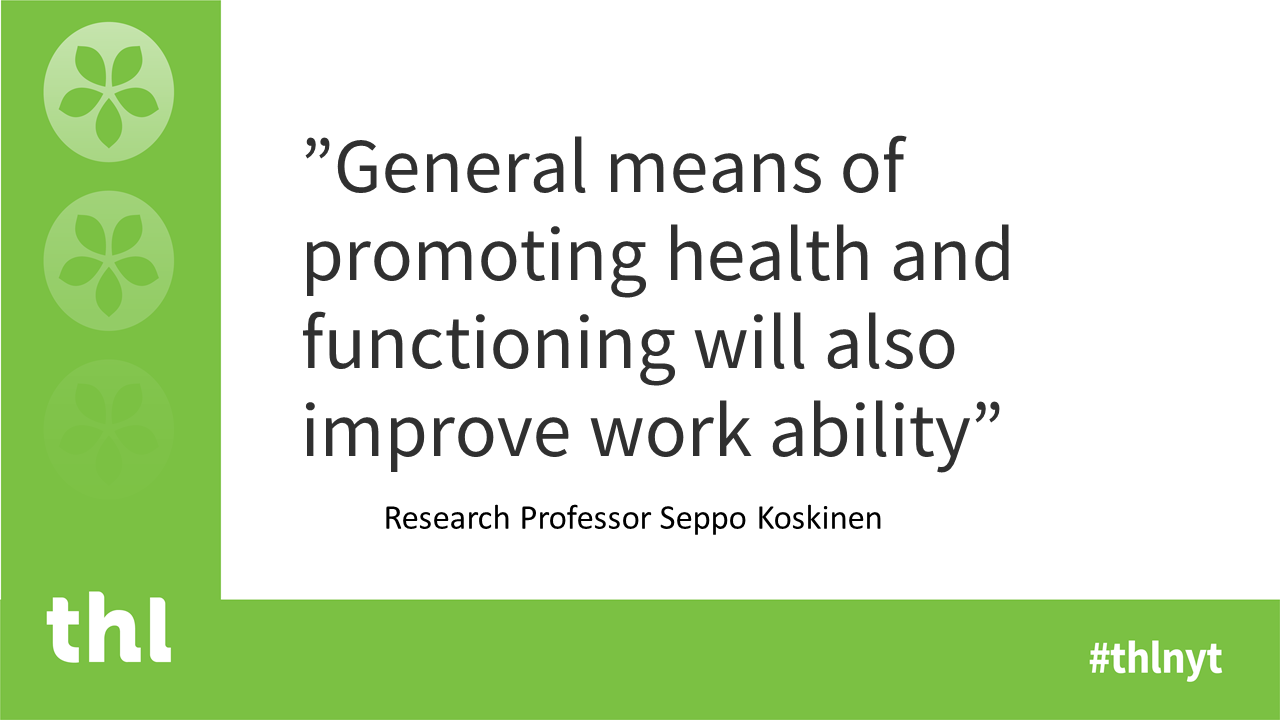Work ability of people under 50 sees decline during the coronavirus epidemic
During the coronavirus epidemic, the work capacity of people under the age of 50 has declined. The negative change is particularly evident with women.
At the end of 2020, 14 percent of women aged 25-49 said they were completely or partially unable to work. In 2017, the corresponding figure was 9 percent. At the end of 2020, 11 per cent of men in the same age considered themselves completely or partially unable to work. In 2017, this figure was 8 percent.
On the other hand, the personal experience of work ability for people aged 50 and over has remained almost the same between 2017 and 2020. The results are based on the Finnish Institute for Health and Welfare FinHealth Studies in 2017 and 2020.

A significant share of Finns under 50 years of age reported changes in their work and financial situation during the coronavirus epidemic. Remote work has increased, and physical active commuting has decreased. Especially women under 50 years of age are concerned about whether their employment will continue and their financial situation.
Fortunately, there are also positive news on the working ability of the population. In 2017, more than two thirds of those aged 50–69 felt they were completely fit for work. More than half of those aged 65–69 also felt completely fit for work – even though most were no longer in working life. Up to 40 percent of those aged 75–79 considered themselves completely fit for work.
The work ability of Finns improved considerably until the beginning of the 2010s at which time the positive development came to a halt. Differences in work ability between education groups have remained high. The proportion of people with limited work ability – those who are partly or completely unable to work – continues to be highest among those with only a basic education.
A boost to work ability with better health and functional ability
In order to reduce the negative health and welfare impacts of the coronavirus epidemic, particular attention must be given to promoting the work ability of women under the age of 50. Many of them may have been particularly burdened with increased care of children and the elderly while restrictions were in place.
The number of people aged 80 or over will double in Finland over the next two decades. This will inevitably significantly increase the need for labour, in areas such as social and health services. As the same time the working-age population ages and diminishes in size, and the declining number of births will accelerate, the decrease in working-age population. These demographic trends will pose a threat to the economic and social sustainability of society.
"We must improve the opportunities for healthy diet, physical activity, the avoidance of intoxicants and the prevention of obesity, especially for those with low incomes and a low level of education. General means of promoting health and functioning will also improve work ability,” notes Research Professor Seppo Koskinen.
"The existing work ability of employees must be supported better than at present. Work tasks and working hours must be adapted to the employee's abilities so that they can continue in their work in a meaningful manner. This will also promote their personal welfare," Koskinen says.
"It is particularly important to recognise the ability and willingness of the older population to take part in gainful employment. It will be necessary to create conditions that will allow them to have a work life that best suits them in accordance with their personal needs and wishes. This will help us strengthen the economic basis of our welfare society. In addition, meaningful work that takes into account the employee's own prerequisites and goals maintains the health and functioning of older people," Koskinen says.
Source
The results are based on data from the FinHealth 2017 follow-up study, the FinSote 2018 and 2020 studies and previous THL population study materials. The data for the FinSote study was collected from September 2020 to February 2021. The FinHealth study’s survey was conducted from October 2020 to January 2021.
More information
The FinHealth 2017 Follow-up Study
Seppo Koskinen
Research Professor
Finnish Institute for Health and Welfare
Tel. +358 29 524 8762
[email protected]
Päivi Sainio
Senior Researcher
Finnish Institute for Health and Welfare
Tel. +358 29 524 8767
[email protected]



